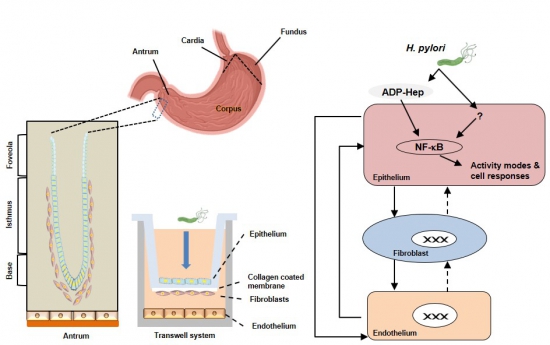AP10: Modes of Helicobacter pylori-induced NF-κB activity in the gastric mucosa
|
Arun KanthasamyPhD Student
Michael NaumannProject Leader |
Helicobacter pylori is a type I carcinogen and a known risk factor for several gastroduodenal diseases, including gastric cancer. We investigate several effectors leading to the activation of classical nuclear factor kappa-light-chain-enhancer of activated B-cells (NF-κB) by H. pylori. ADP-glycero-b-D-manno-heptose (ADP-Hep) has been characterized as the virulence factor that induces rapid and short-lived NF-κB activity. However, less in known about the activity of NF-κB during long-term H. pylori infection within the gastric mucosa. The study of the gastric microenvironment is challenging due to the complexity of the numerous cellular processes that are initiated during infection. The main cross-talk in the gastric microenvironment happens between epithelial cells, fibroblasts and endothelial cells. To characterize the NF-κB-dependent cellular cross-talk, we will use a triple co-culture system to mimic the conditions in the gastric microenvironment. Herein, we will also use isogenic mutants of H. pylori as well as knockdown and knockout cell lines. We expect that the triple co-culture system in combination with the isogenic mutants of H. pylori should help us to understand the different mechanisms by which H. pylori induces pro-inflammatory NF-κB signaling in the gastric microenvironment.
|
Photos: by UMMD, Melitta Schubert/Sarah Kossmann








